Ruby on Rails developers are the backbone of your web application's server-side logic. They are responsible for writing clean, maintainable code and ensuring that your application runs smoothly and efficiently.
Skills for a Ruby on Rails developer include proficiency in Ruby, Rails framework, and related technologies like SQL, HTML, and JavaScript. Additionally, they should have strong problem-solving abilities and effective communication skills.
Candidates can write these abilities in their resumes, but you can’t verify them without on-the-job Ruby On Rails Developer skill tests.
In this post, we will explore 9 essential Ruby On Rails Developer skills, 11 secondary skills and how to assess them so you can make informed hiring decisions.
Table of contents
9 fundamental Ruby On Rails Developer skills and traits
The best skills for Ruby On Rails Developers include Ruby Language, Rails Framework, Database Management, HTML/CSS, JavaScript, Version Control, Testing Frameworks, API Development and Deployment.
Let’s dive into the details by examining the 9 essential skills of a Ruby On Rails Developer.
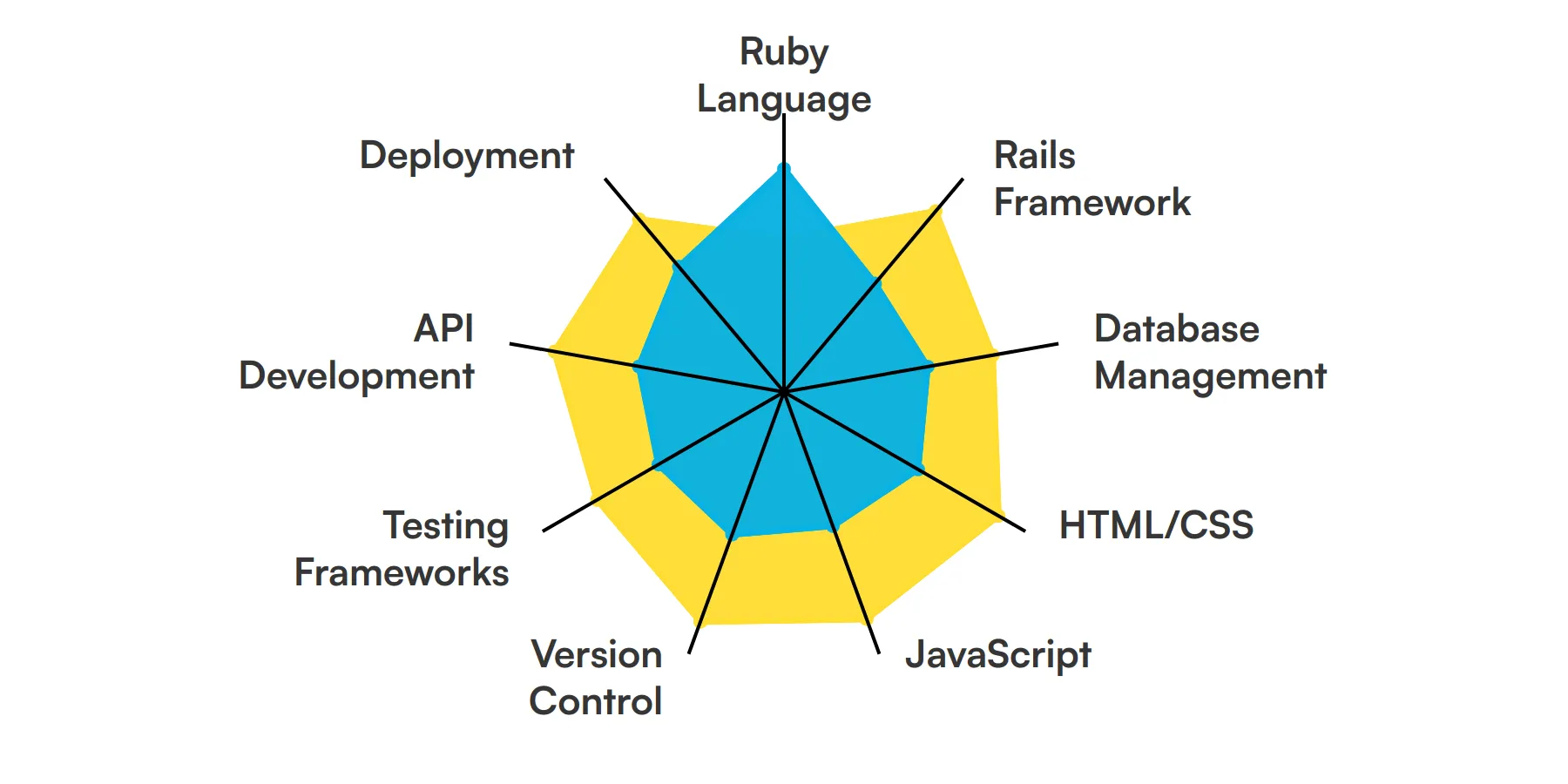
Ruby Language
A Ruby on Rails developer must have a strong grasp of the Ruby programming language. This includes understanding its syntax, object-oriented principles, and common libraries. Ruby is the backbone of Rails, and proficiency in it allows developers to write clean, maintainable code.
For more insights, check out our guide to writing a Ruby on Rails Developer Job Description.
Rails Framework
In-depth knowledge of the Rails framework is crucial. This includes understanding the MVC architecture, RESTful design, and the various built-in tools and libraries that Rails offers. Mastery of Rails enables developers to build scalable and efficient web applications.
Database Management
A solid understanding of database management is essential. This includes working with SQL databases like PostgreSQL or MySQL, as well as using ActiveRecord for database interactions. Effective database management ensures data integrity and performance.
HTML/CSS
Proficiency in HTML and CSS is necessary for front-end development. A Ruby on Rails developer should be able to create and style web pages, ensuring they are responsive and user-friendly. This skill bridges the gap between back-end logic and user interface.
JavaScript
Knowledge of JavaScript is important for adding interactivity to web applications. Understanding frameworks like React or Vue.js can be beneficial. JavaScript allows developers to enhance user experience with dynamic content and client-side logic.
Check out our guide for a comprehensive list of interview questions.
Version Control
Experience with version control systems like Git is a must. It helps in tracking changes, collaborating with team members, and managing codebases efficiently. Version control is fundamental for maintaining a clean and organized development workflow.
Testing Frameworks
Familiarity with testing frameworks such as RSpec or Minitest is important. Writing tests ensures that the code is reliable and free of bugs. A Ruby on Rails developer should be able to write unit, integration, and functional tests to maintain code quality.
API Development
Understanding how to develop and consume APIs is crucial. This includes working with RESTful services and possibly GraphQL. APIs allow different parts of an application to communicate and integrate with third-party services.
Deployment
Knowledge of deployment processes and tools like Capistrano, Docker, or Heroku is essential. A Ruby on Rails developer should be able to deploy applications smoothly and manage different environments. This ensures that the application runs reliably in production.
For more insights, check out our guide to writing a Devops Engineer Job Description.
11 secondary Ruby On Rails Developer skills and traits
The best skills for Ruby On Rails Developers include Command Line, Security Best Practices, Performance Optimization, Background Jobs, DevOps, Responsive Design, Template Engines, Third-Party Integrations, Containerization, Analytics and SEO.
Let’s dive into the details by examining the 11 secondary skills of a Ruby On Rails Developer.
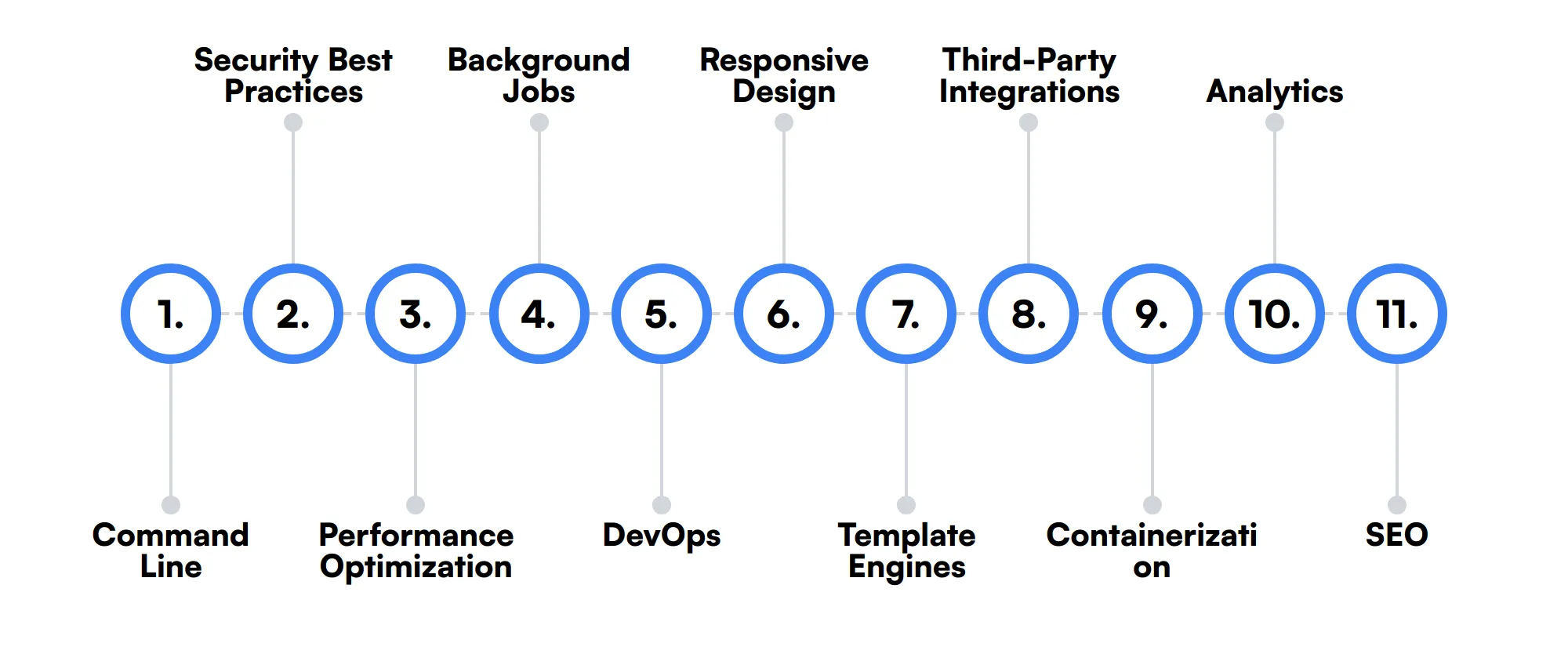
Command Line
Comfort with the command line is beneficial for various development tasks, including running scripts, managing files, and using version control.
Security Best Practices
Understanding security best practices helps in protecting applications from common vulnerabilities like SQL injection, XSS, and CSRF.
Performance Optimization
Skills in performance optimization can improve the speed and efficiency of web applications. This includes techniques like caching, query optimization, and code refactoring.
Background Jobs
Experience with background job processing using tools like Sidekiq or Resque is useful for handling asynchronous tasks and improving application performance.
DevOps
Basic knowledge of DevOps practices can be advantageous. This includes understanding CI/CD pipelines, server management, and cloud services.
Responsive Design
Skills in responsive design ensure that web applications work well on various devices and screen sizes, providing a better user experience.
Template Engines
Familiarity with template engines like ERB or Haml is useful for rendering dynamic content in web applications.
Third-Party Integrations
Experience with integrating third-party services, such as payment gateways or social media APIs, can enhance the functionality of web applications.
Containerization
Knowledge of containerization tools like Docker can help in creating consistent development environments and simplifying deployment processes.
Analytics
Understanding how to implement and use analytics tools can provide insights into user behavior and application performance.
SEO
Basic knowledge of SEO practices can help in improving the visibility of web applications in search engine results.
How to assess Ruby On Rails Developer skills and traits
Assessing the skills and traits of a Ruby on Rails Developer involves more than just glancing at their resume. It requires a deep dive into their practical abilities across various technical domains such as Ruby language, Rails framework, and database management, as well as their proficiency in front-end technologies like HTML/CSS and JavaScript.
While traditional hiring methods rely heavily on interviews and past experiences, modern approaches emphasize skill-based assessments. These assessments provide a clear picture of a candidate's capabilities in handling real-world tasks, from API development to deployment and version control.
Incorporating Adaface assessments into your hiring process can transform how you evaluate Ruby on Rails developers. By focusing on practical tests tailored to include key skills such as testing frameworks and API development, you can ensure a more effective screening process. Learn more about Adaface assessments here, which have been shown to reduce screening time by 85%.
Let’s look at how to assess Ruby On Rails Developer skills with these 6 talent assessments.
Ruby Online Test
Our Ruby Online Test evaluates candidates on their knowledge of the Ruby programming language, including their proficiency in working with classes, objects, modules, control structures, and data types.
The test assesses their understanding of Ruby basics, data types, control flow, methods, classes and objects, exceptions, modules, file handling, regular expressions, and database connectivity. It includes a coding question to evaluate hands-on Ruby programming skills.
Successful candidates demonstrate a strong grasp of Ruby's core concepts and the ability to design and develop applications using the Ruby language and its associated frameworks.
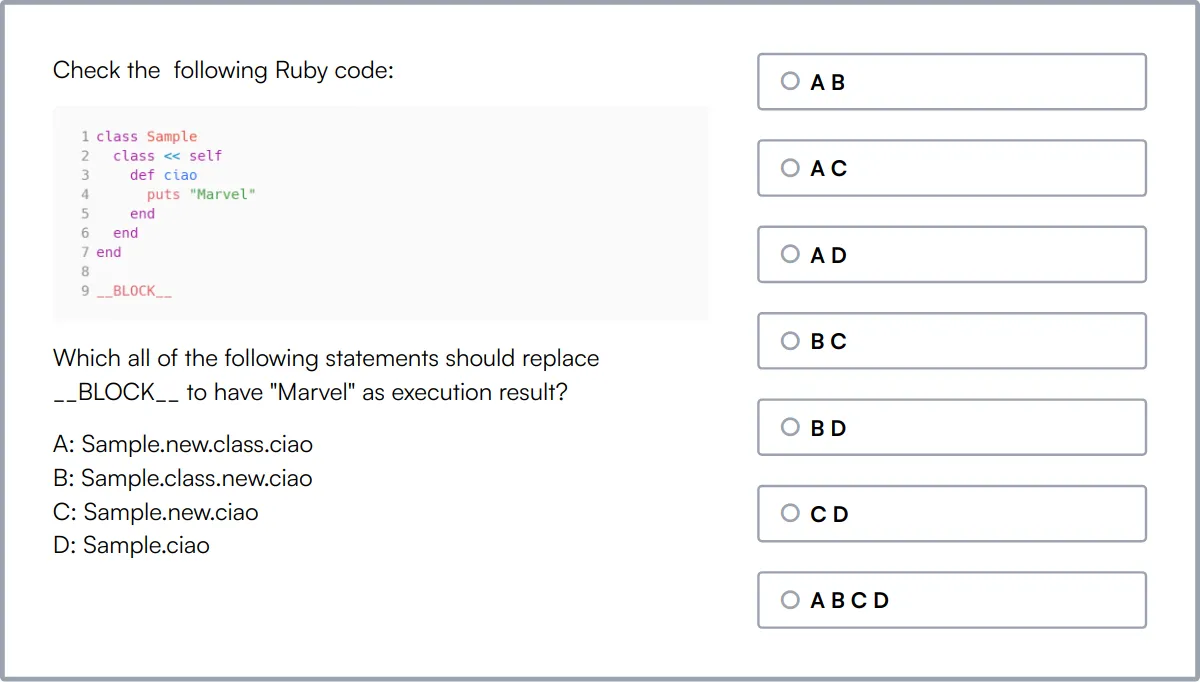
Ruby & Rails Online Test
Our Ruby & Rails Online Test evaluates candidates on their proficiency in the Ruby programming language and the Rails web framework.
The test assesses their understanding of Ruby basics, object-oriented programming, Rails fundamentals, MVC architecture, REST APIs, and Ruby coding. It includes scenario-based MCQs and a coding question to evaluate practical skills.
Candidates who perform well show proficiency in using Ruby and Rails to develop scalable and maintainable web applications, as well as their ability to use Ruby gems, tools, and libraries to solve common programming problems.
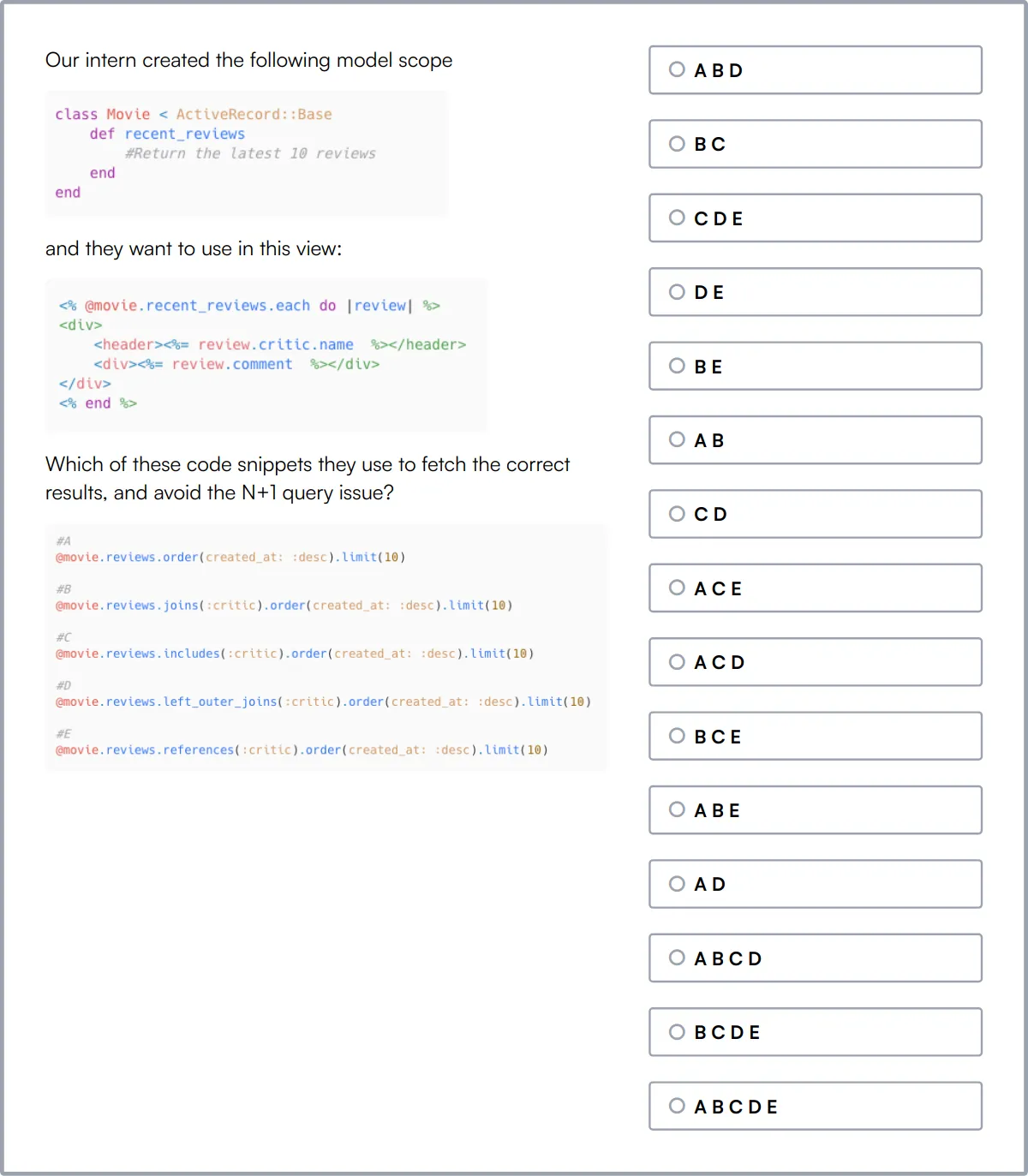
Data Modeling Skills Test
Our Data Modeling Skills Test evaluates a candidate's knowledge and abilities in database design and SQL.
The test assesses their understanding of data modeling, database design, SQL, ER diagrams, normalization, relational schema, data integrity, data mapping, data validation, and data transformation.
High-scoring candidates demonstrate a strong grasp of database concepts and the ability to design efficient and reliable database schemas.
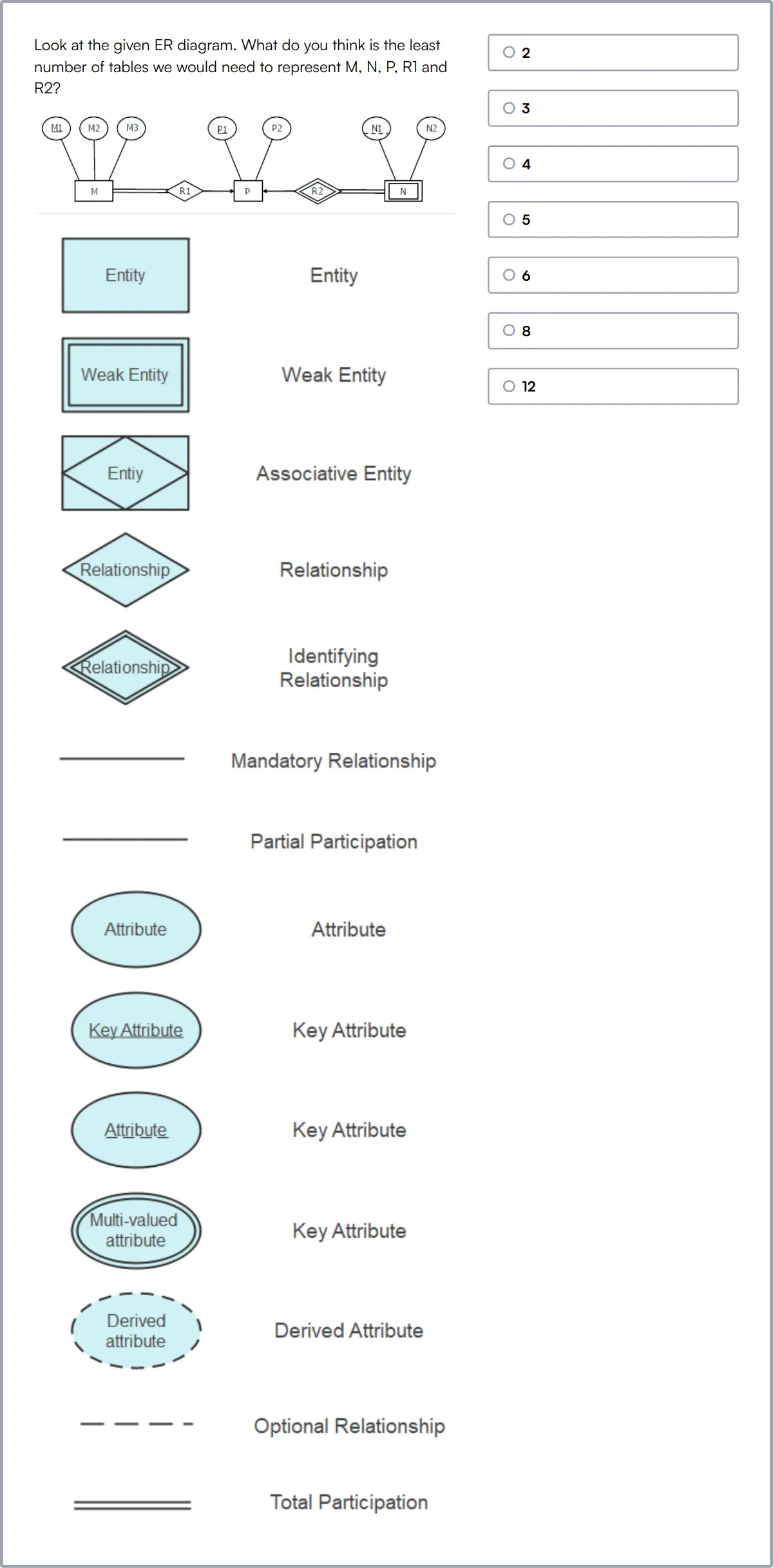
HTML/ CSS Online Test
Our HTML/ CSS Online Test evaluates a candidate's ability to create web pages and style them using CSS.
The test assesses their understanding of core HTML tags, handling HTML forms, core CSS concepts (box model, inheritance, specificity), styling HTML elements, Flexbox and Grids, responsive design, working with images, integrating custom fonts, and CSS-based animations.
Successful candidates have a strong understanding of CSS layout techniques, responsiveness, and browser compatibility.
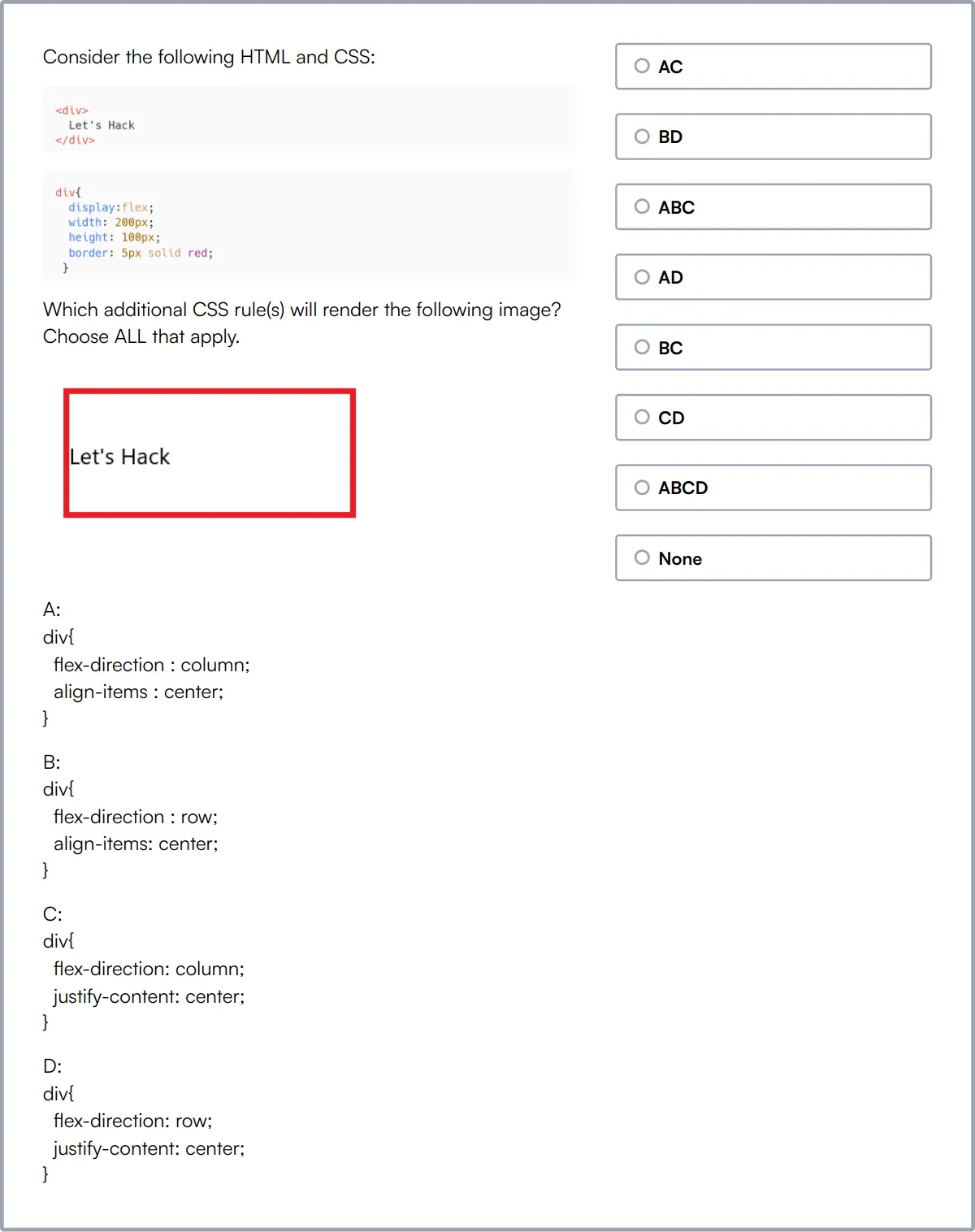
JavaScript Online Test
Our JavaScript Online Test evaluates candidates on JavaScript fundamentals and their ability to manipulate the HTML DOM.
The test assesses their understanding of JavaScript basics (arrays, objects, strings, functions), structuring and styling HTML DOM, errors and exception handling, working with user data and JSON, ES6 features, higher-order functions and closures, OOP concepts, asynchronous JavaScript, and handling APIs.
We offer a selection of JavaScript tests, including debugging and data structuring, so you can gauge various skill levels.
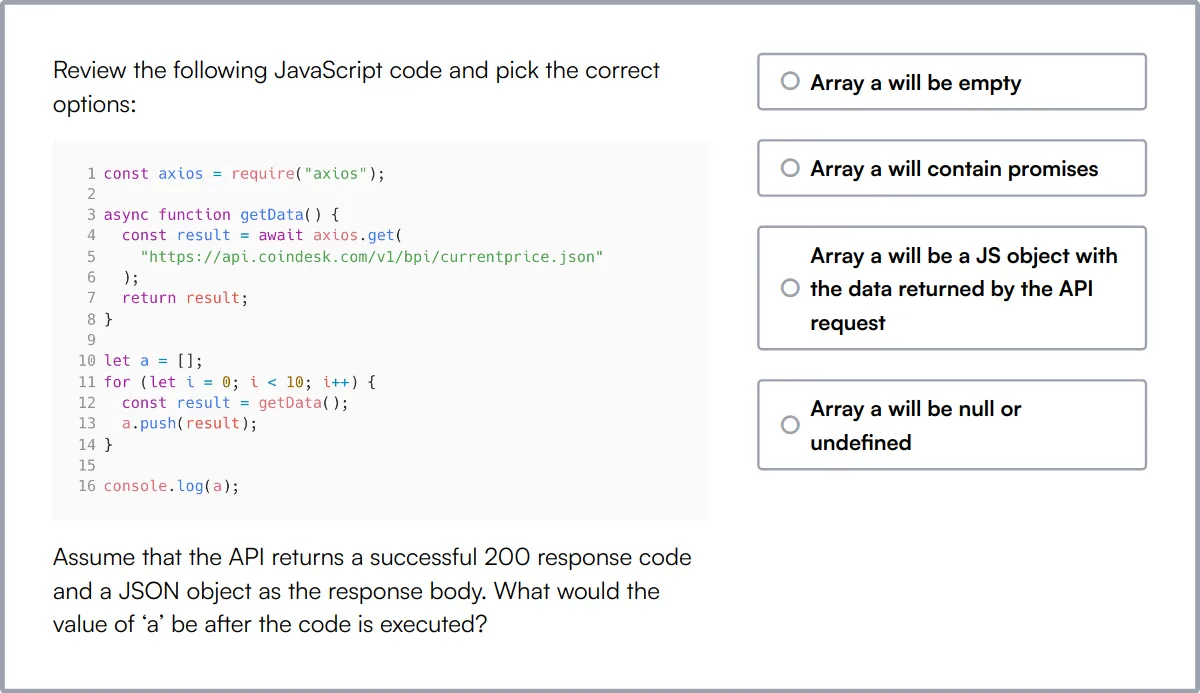
Git Online Test
Our Git Online Test evaluates candidates on their understanding of Git, a popular version control system.
The test assesses their knowledge of Git basics, repository creation, branching and merging, committing changes, conflict resolution, remote repositories, rebasing, Git workflows, Git commands and concepts, and Git branching models.
Candidates who perform well demonstrate proficiency in using Git to manage source code and resolve conflicts effectively.
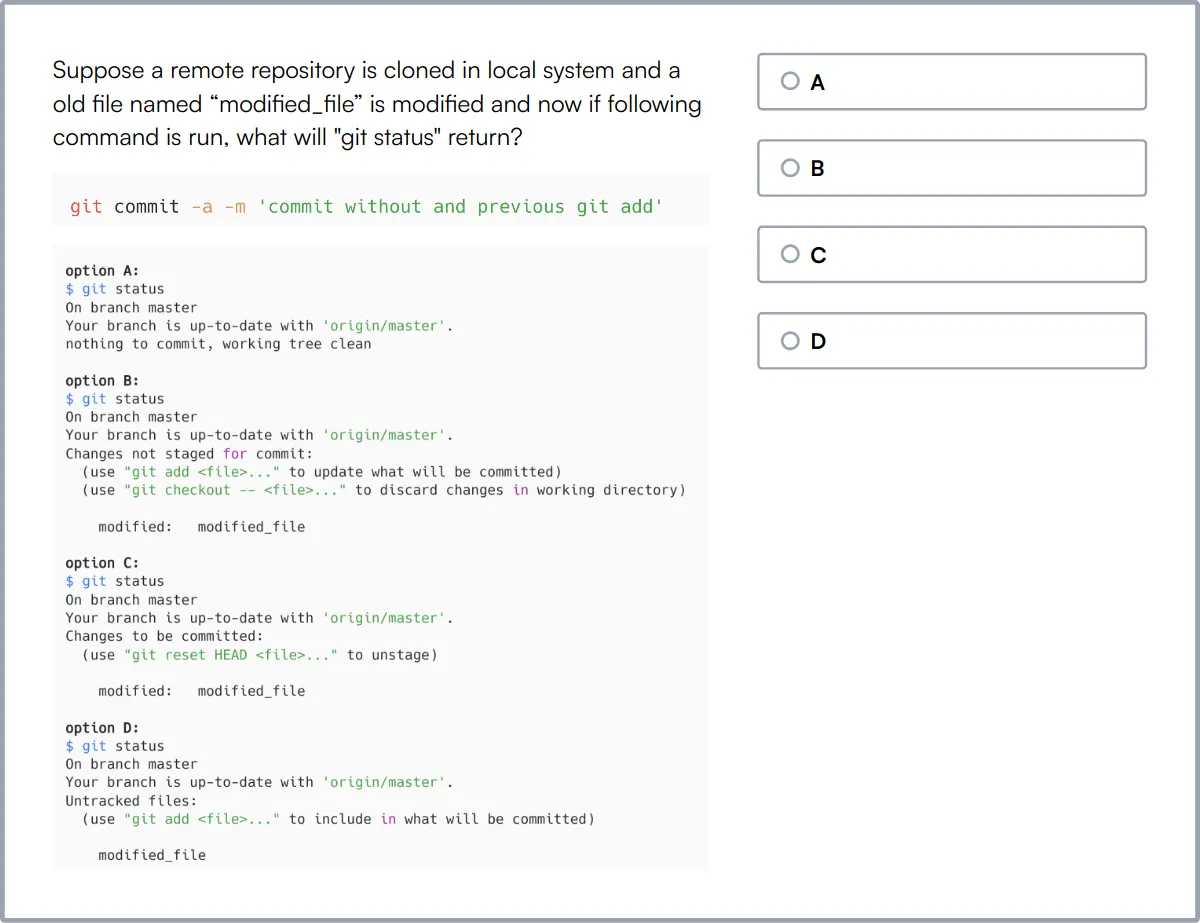
Summary: The 9 key Ruby On Rails Developer skills and how to test for them
| Ruby On Rails Developer skill | How to assess them |
|---|---|
| 1. Ruby Language | Evaluate proficiency in writing clean, maintainable Ruby code. |
| 2. Rails Framework | Assess ability to build scalable web applications using Rails. |
| 3. Database Management | Check skills in designing and querying databases. |
| 4. HTML/CSS | Gauge how a developer creates a well-structured, user-friendly interface. |
| 5. JavaScript | Assess a developer’s skills in creating interactive, dynamic designs. |
| 6. Version Control | Evaluate experience in managing code with Git. |
| 7. Testing Frameworks | Determine ability to write and execute automated tests. |
| 8. API Development | Check skills in building and integrating APIs. |
| 9. Deployment | Assess experience in deploying applications to production environments. |
Ruby on Rails Online Test
Ruby On Rails Developer skills FAQs
What are the key skills to look for in a Ruby on Rails developer?
Key skills include proficiency in Ruby language, Rails framework, database management, HTML/CSS, JavaScript, version control, and testing frameworks.
How can I assess a candidate's proficiency in Ruby language?
You can assess Ruby proficiency through coding tests, technical interviews, and reviewing their past projects or contributions to open-source Ruby projects.
Why is experience with the Rails framework important?
Experience with Rails is important because it streamlines web application development, providing conventions and tools that enhance productivity and maintainability.
What should I look for in a candidate's database management skills?
Look for experience with SQL, database design, and familiarity with popular databases like PostgreSQL or MySQL. Assess their ability to optimize queries and manage migrations.
How do I evaluate a developer's knowledge of version control systems?
Evaluate their experience with Git by asking about their workflow, branching strategies, and how they handle merge conflicts. Reviewing their GitHub profile can also be insightful.
What testing frameworks should a Ruby on Rails developer be familiar with?
A good developer should be familiar with RSpec, Capybara, and Minitest. Assess their ability to write and maintain tests for different parts of the application.
How important is API development experience for a Ruby on Rails developer?
API development is important for building scalable and maintainable applications. Look for experience with RESTful APIs, JSON, and tools like Postman for testing.
What are some ways to assess a candidate's understanding of security best practices?
Ask about their experience with common security vulnerabilities (e.g., SQL injection, XSS) and how they mitigate them. Reviewing their past projects for security measures can also be helpful.

40 min skill tests.
No trick questions.
Accurate shortlisting.
We make it easy for you to find the best candidates in your pipeline with a 40 min skills test.
Try for freeRelated posts
Free resources



